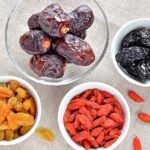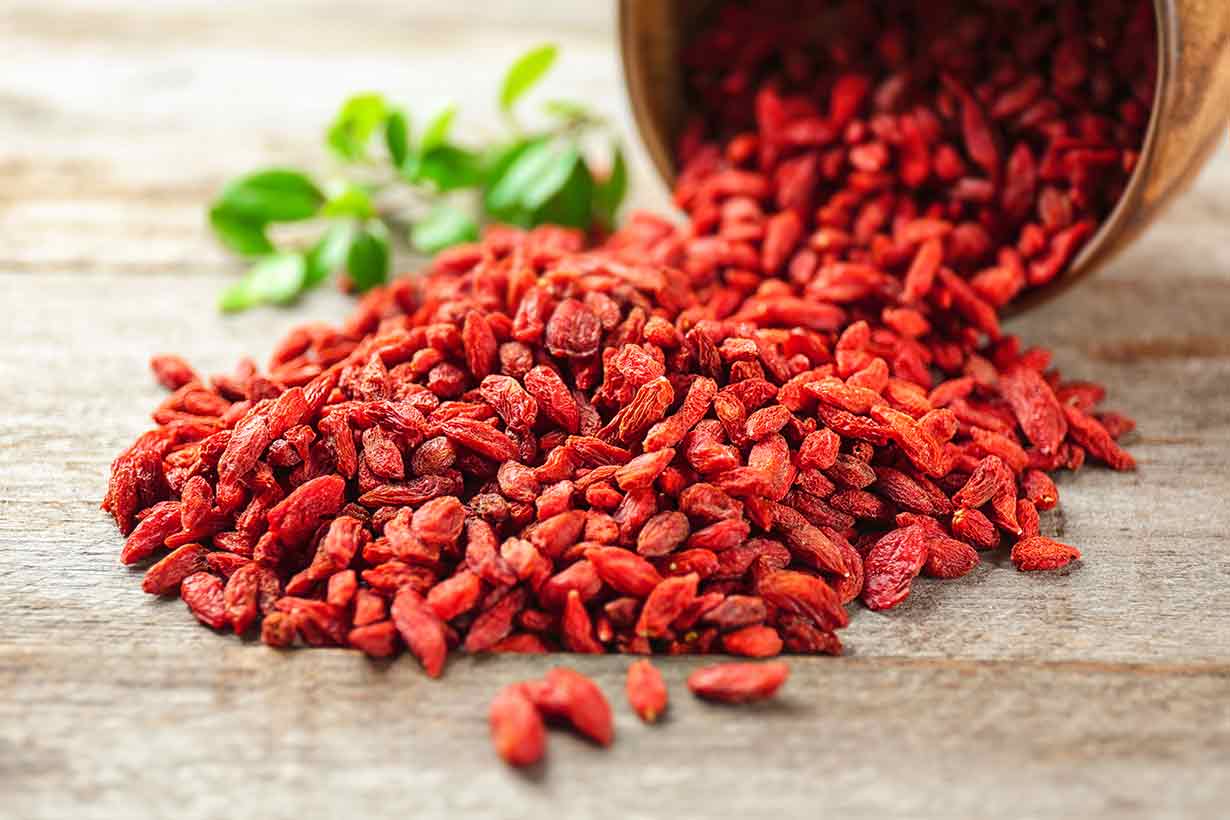Dried Dates: Nutrition, Health Benefits, and Research
Dried dates are among the most popular types of dried fruit.
Although they are consumed throughout the year, they are especially popular during holidays such as Christmas and Ramadan.
But what do they offer in terms of nutritional content and potential health benefits?
This article provides a nutritional guide to dried dates, detailing their nutrient content and examining scientific research on their potential benefits.
Table of contents
Key Nutrients

A typical 40-gram serving of dried dates contains 113 calories and 3.2 grams of fiber. The vitamins and minerals provided in the highest amounts include:
- Copper: 9% of the daily value (DV)
- Potassium: 6% DV
- Magnesium: 4% DV
- Phosphorus: 2% DV
- Vitamin B6: 4% DV
- Niacin: 3% DV
Among these nutrients, potassium is noteworthy as the 2020-2025 Dietary Guidelines for Americans identified it as a dietary component of public health concern (2).
This classification was due to the widespread underconsumption of potassium, which has a key role in helping to lower blood pressure (3).
A small handful of dates helps contribute to potassium intake, providing 6% of the daily value.
In addition to these key nutrients, a complete nutritional profile for dates will be provided later in this article for reference.
Key point: A 40-gram serving of dried dates is a good source of fiber, copper, and potassium.
Research on the Potential Health Benefits of Dates
Numerous studies have specificially investigated the health effects of date consumption.
In this section, we’ll examine this research and what we can learn from it.
Do dates have evidence-based health benefits? Let’s take a look.
Dates and Their Impact on Labor and Childbirth
Several studies have explored whether date intake can help to improve childbirth outcomes.
Some of this research suggests that consuming dates may reduce the duration of labor.
Three systematic reviews have examined the available evidence on this topic:
- A systematic review and meta-analysis published in 2024 investigated whether consuming dates supports safe childbirth. The study analyzed data from 48 studies and found that date intake during late pregnancy shortened labor and increased cervical dilatation. However, the authors noted that most of the evidence quality was of low quality (4).
- A 2020 systematic review of eight clinical studies, involving 380 participants, found that consuming dates “can significantly reduce the active phase of labor.” However, as with the previous review, the authors emphasized that the studies were not of high quality and recommended further research (5).
- A 2019 systematic review and meta-analysis of clinical trials indicated that date intake reduced the duration of both gestation and the active (first) phase of labor (6).
The consistent findings across studies indicate that dates have the potential to shorten labor. However, the lack of high-quality evidence necessitates further, well-designed studies to confirm these effects.
Key point: Research suggests that date consumption may shorten labor during childbirth. However, the available studies are of low quality, and more rigorous research is needed.
Dates Are a Rich Source of Polyphenols
Studies have shown that dates contain substantial amounts of polyphenols.
Polyphenols are a type of phytochemical–plant compounds that can influence biological processes in the human body. A significant body of research has consistently linked dietary patterns high in polyphenols to a lower risk of death from any causes (7).
Regarding the phenol content of date fruits, a systematic review and meta-analysis published in 2021 provided relevant data (8).
This review analyzed data from 22 studies that reported on the polyphenol content of dates. Pooling data from all studies, the mean and median phenol content of dates were found to be 246.68 mg and 292.92 mg of gallic acid equivalents (GAE) per 100 grams.
The authors highlighted that these levels are high compared to other fruits. For example, research has shown that red apples and lemons have a phenol content of 73.96 mg and 61.47 mg GAE per 100g, respectively (9).
The primary polyphenols found in dates include caffeic acid, ferulic acid, catechin, gallic acid, p-coumaric acid, resorcinol, quercetin, protocatechuic acid, rutin, and apigenin.
For those interested in polyphenols, figs and prunes are other excellent dried fruit options.
Key point: Dates contain high amounts of polyphenols, compounds found in plants that may help support health and longevity.
Dates May Help Lower the Risk of Constipation
Research suggests that dates may potentially help to reduce constipation.
In a randomized controlled trial, 22 participants were split into two groups: an intervention group that consumed seven dates (50 grams) daily for 21 days and a control group that consumed maltodextrin and dextrose, simple sugars (10).
After 21 days, participants who consumed dates showed a significant higher stool frequency compared to those in the control group (11).
This effect is likely due to the high fiber content of dates.
Dates, Glycemic Index, and Their Effect on Blood Sugar
The glycemic index is a scale that measures how quickly a food raises blood sugar levels. It ranges from 0 (minimal impact) to 100 (pure glucose).
The International Tables of Glycemic Index list dates as having a glycemic index of 42, which is classed as low (12).
Additionally, a clinical study investigated the the glycemic index of five varieties of dates (13).
The results showed that the glycemic index of dates ranged from 43 to 55, depending on the variety and whether or not the participants had type 2 diabetes.
A 2021 meta-analysis of five clinical studies also found that date consumption slightly reduced fasting blood sugar levels (14). However, the studies were small, and their results varied from study to study, making it difficult to draw a clear conclusion.
For this reason, the researchers recommended further research to better understand the effect of dates on blood sugar.
Key Point: Dates have a fairly low glycemic index, ranging from 42 to 55. While several small studies have indicated they may help reduce fasting blood sugar levels, further research is necessary to confirm these effects.
How Strong is the Evidence For Dates Having Clinically Significant Health Benefits?
When considering whether dates have clinically significant health benefits, it’s important to examine the strength of the evidence.
As discussed, dates are a reasonably good source of nutrients and contain a high level of polyphenols. Research also suggests they may provide benefits during pregnancy, help with blood sugar control, and promote regular bowel movements.
However, much of the available research supporting these benefits comes from small studies, some of which have been rated as “low quality.”
A 2020 systematic review of clinical trials supports this cautious stance. The review assessed the evidence for dates having clinical effects and concluded that. at present, there is insufficient evidence to support significant clinical benefits. The authors emphasized that further high-quality clinical trials are required (15).
Key Point: The current evidence for dates providing clinically significant benefits is weak. More research is necessary to confirm these potential effects.
Complete Nutritional Profile of Dried Dates
Sourced from USDA data, here are the full nutritional values for dried dates per 40-gram serving (1, 16).Nutrient Amount % Daily Value Calories 113 kcal Carbohydrates 30 g 11% Fiber 3.2 g 11% Sugars 25.3 g Fat 0.16 g <1% Saturated fat 0.01 g <1% Monounsaturated fat 0.01 g Polyunsaturated fat 0.01 g Protein 0.98 g 2% Cholesterol 0 mg 0%
Vitamins
| Vitamin | Amount | % Daily Value |
|---|---|---|
| Choline | 2.52 mg | <1% |
| Folate, DFE | 7.6 mcg | 2% |
| Thiamin (B1) | 0.02 mg | 2% |
| Riboflavin (B2) | 0.03 mg | 2% |
| Niacin (B3) | 0.51 mg | 3% |
| Vitamin B6 | 0.07 mg | 4% |
| Vitamin B12 | 0 mcg | 0% |
| Vitamin A, RAE | 0 mcg | 0% |
| Vitamin C | 0.16 mg | <1% |
| Vitamin D | 0 mcg | 0% |
| Vitamin E | 0.02 mg | <1% |
| Vitamin K | 1.02 mcg | 1% |
Minerals
| Mineral | Amount | % Daily Value |
|---|---|---|
| Calcium | 15.6 mg | 1% |
| Copper | 0.08 mg | 9% |
| Iron | 0.41 mg | 2% |
| Magnesium | 17.2 mg | 4% |
| Phosphorus | 24.8 mg | 2% |
| Potassium | 262 mg | 6% |
| Selenium | 1.2 mcg | 2% |
| Sodium | 0.8 mg | <1% |
| Zinc | 0.12 mg | 1% |
Foods That Nutritionally Complement Dried Dates
If you’re planning to enjoy some dried dates alongside other foods, which ones pair well nutritionally?
- Cheese: Provides calcium, vitamin A, and vitamin B12–nutrients that dried dates lack.
- Avocado: A rich source of nutrients like vitamins E and K, which are present only in small amounts in dried dates.
- Eggs: Contain high levels of choline and vitamin B12, which are absent in dried dates.
- Dried apricots: Complementing dates with dried apricots offers the vitamin A they lack.
- Berries: Most berries are excellent sources of vitamin C, a nutrient dates don’t provide in appreciable amounts.
Summary
Dried dates have an enjoyable flavor and are a good source of fiber, copper, and potassium. They also contain high amounts of polyphenols, which may confer benefits.
While research suggests dates may have potential health benefits, the consensus from the existing studies is that there isn’t strong enough evidence to support significant clinical effects.
For now, dried dates are best thought of as an enjoyable food that provides key nutrients, while further research is necessary to better understand their potential health benefits.






